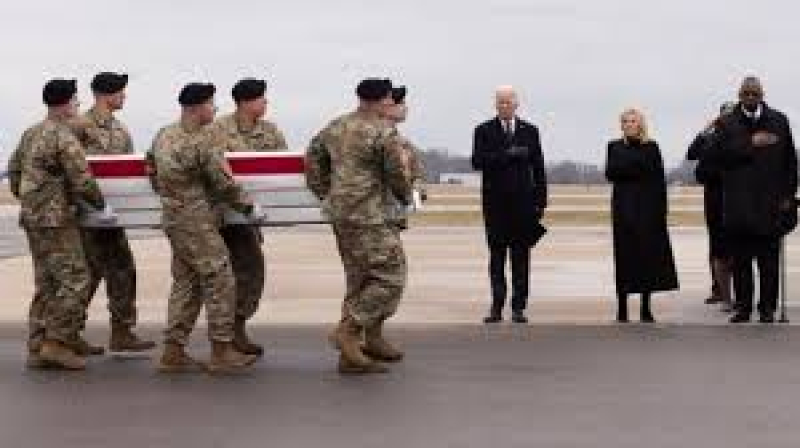- Referendum Sees 4.82cr ‘Yes’ Votes, Turnout 60.84% |
- EC Issues Gazette for 297 Newly Elected MPs |
- 9-year-old boy beaten to death over betel nut theft in M’singh |
- BNP fast-tracks cabinet plans after resounding victory |
Iran says Syria and Iraq strikes are a 'strategic mistake'

Iran has called US air strikes on Iraq and Syria a "strategic mistake" after 85 targets were hit across the region on Friday.
The US has launched retaliatory strikes in response to last week's drone attack on a US military base that killed three American soldiers.
The White House blamed the drone attack on an Iran-backed militia group.
The US and UK also launched a new round of joint strikes on Houthi targets in Yemen on Saturday.
Iran's foreign ministry said the strikes on Iraq and Syria "will have no result other than intensifying tensions and instability in the region".
Earlier, Iraq said the US retaliatory strikes would bring "disastrous consequences" for the region.
At least 16 people, including civilians, were killed as a result of the strikes, Iraqi officials said.
A spokesman for Iraq's prime minister said the strikes were a "violation" of his country's sovereignty and that they would impact "the security and stability of Iraq and the region".
While Syria said the US "occupation" of Syrian territory "cannot continue".
According to a US military statement, the US struck Iranian Revolutionary Guards Corps (IRGC) Quds Force and affiliated militias in Iraq and Syria.
Several US aircraft were involved, including long-range bombers that flew over from the US.
Seven locations were hit - four in Syria and three in Iraq - with more than 85 targets being struck, the US military said.
There have been no strikes on Iranian soil.
Since Friday's US strikes in Iraq and Syria, there has been one attack on American forces, a US defence official told the BBC's US partner CBS News.
The attack in question targeted US forces based at the Mission Support Site Euphrates in Syria using rockets, but no injuries were reported.
President Joe Biden said the US attacks "will continue at times and places of our choosing" but added his country "does not seek conflict in the Middle East or anywhere else in the world".
The strikes come after three US troops were killed and dozens injured in a drone attack on a US base near Jordan's border with Syria.
US officials said the Islamic Resistance in Iraq, an Iranian-backed militia group, was responsible for the attack. The drone was Iranian-made, they said, and similar to the ones being supplied to Russia.
The militant organisation - an umbrella group of multiple militias - is believed to have been armed, funded and trained by the IRGC.
Iran has denied any role in the attack on the US base, saying it was "not involved in the decision making of resistance groups".
A spokesperson for Iran's foreign ministry said US strikes on Iraq, Syria and Yemen "merely provide for the goals of the Zionist regime", referring to US ally Israel.
Russia has called for an "urgent" meeting of the UN Security Council "over the threat to peace and safety created by US strikes on Syria and Iraq", Moscow's diplomat at the UN, Dmitry Polyansky, said on social media.
Russia - a permanent council member - has become a close ally of Iran.
The US attacks came several hours after Mr Biden attended a repatriation ceremony for William Rivers, 46, Kennedy Sanders, 24, and Breonna Moffett, 23, who died in the attack last weekend.
More than 40 other service members were injured in the same drone attack, which struck the US Tower 22 base.
US Republicans criticised the timing of the retaliatory strikes, saying that the US had waited too long to strike back. American officials said any hold up was due to cloudy weather obstructing targets, reports BBC.
Some foreign policy experts believe the delay allowed Iran to withdraw personnel, potentially avoiding a wider conflict between the US and Iran.

